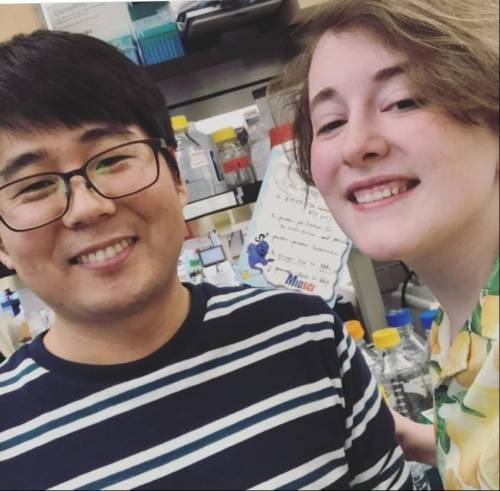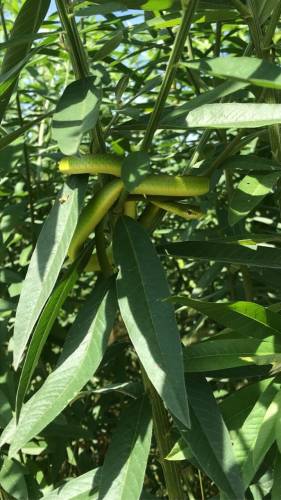One of the University of Missouri’s College of Agriculture, Food and Natural Resources (CAFNR) Programs of Distinction, the Interdisciplinary Plant Group (IPG) is a community of MU faculty postdoctoral fellows and professionals who are pursuing novel, creative and transformative ideas in the field of plant biology. Students across the Mizzou campus, including those in CAFNR, play an important role in the IPG’s success – especially through the Freshman Research in Plants (FRIPS) Program.
Funded by a series of grants from the National Science Foundation (NSF), the FRIPS Program at MU allows first-year/first-time undergraduate students an opportunity to get a first-hand look at the exciting plant research taking place on campus. Not only do these students have the chance to experience cutting-edge plant biology research, they are also able to learn from esteemed IPG faculty.
“Working with so many people in so many areas was great,” said Sam Yanders, a junior majoring in plant sciences. “It gave me incredible networking opportunities and introduced me to fields that I had no idea about in plant science. Through the weekly IPG seminars, I was able to talk with many renowned plant scientists from MU and around the world, and learn more about their research. This made me a more well-rounded researcher and helped me connect with people I otherwise wouldn’t have met.

“In fact, I am still working in the same lab as I was freshman year! The FRIPS program helped me prepare to work on my own projects and think more critically about aspects of research. In our weekly FRIPS meetings, we discussed applying for funding, reading and writing scientific manuscripts, properly citing sources, and other important skills for researchers to have. These all helped me continue my research career, as well as giving me a year to get used to working in a lab setting before letting me become independent.”
Yanders joined the lab of Gary Stacey, Curators Distinguished Professor in the Division of Plant Science and Technology and Department of Biochemistry, in 2019. Yanders is still a member of the Stacey lab, where she has learned various laboratory techniques, such as plasmid DNA extraction, running gel electrophoresis for separation of macromolecules, preparing media for plant and bacterial growth, preparing and running PCR for DNA amplification, and setting up and accurately recording experiments.
“In my program, I’ve gotten to meet people from all over the world, and received a really broad range of opinions and views on everything that we do,” Yanders said. “Because of this, I feel that FRIPS gave me many new perspectives on why working with plants is important to society and our future.”
Yanders is one of 107 undergraduate students who have participated in the FRIPS Program since 2010.
“Having the chance to meet with and work with the faculty of the IPG was a fantastic experience,” said Meg Vedra, a senior studying biochemistry. “The initial FRIPS interviews with several IPG faculty showed me the wide range of research that is happening on the MU campus every day. As a part of the FRIPS Program, I had the chance to attend several IPG seminars to hear faculty present their research, and elected to take classes with professors like Dr. Paula McSteen (professor of biological sciences, MU College of Arts and Science) and Dr. David Mendoza-Cózatl (director of graduate studies and associate professor, Division of Plant Science and Technology) based on their research.”
Vedra worked in the lab of Antje Heese, an associate professor in the Department of Biochemistry, during her time in the FRIPS Program. Like Yanders, Vedra has continued to work in the same lab she joined as a freshman.
“I feel incredibly privileged to work with such renowned researchers,” Vedra said. “The FRIPS program introduced me to Dr. Heese, who has become a true mentor, both academically and personally. I left my first interview with her not only knowing that I desperately wanted to work in her lab, but also with a better understanding of what it means to be a researcher.
“Following my year in the FRIPS program, I have been able to continue my research in Dr. Heese’s lab under the wonderful guidance of our postdoctoral fellow Nga Nguyen, and I will stay in the Heese lab until I graduate from MU. My experience from freshman year allowed me to apply for and receive the CAFNR Undergraduate Research Internship, which let me immerse myself in a research project of my own design. The FRIPS program wasn’t just about placing you in a lab to do research, it also provided weekly FRIPS meetings led by PhD student Kelly Mason and Nguyen. In these meetings, we focused on professional development, learning how to write an abstract, how to present your research and how to meet others in the field.”
One of the primary goals of the FRIPS Program is to encourage undergraduate students to pursue future research endeavors, including having them consider research careers in plant biology. The program opens the door for students to step into a laboratory setting early in their collegiate careers and encourages them to further that knowledge as they progress through their degree.

“I attribute my interest in furthering my research to the graduate level fully to FRIPS,” said Matthew Jenkins, a senior majoring in plant sciences. His FRIPS research was with Harley Naumann, associate teaching professor in the Division of Plant Science and Technology. “I don’t know if I would’ve sought out the research lab I was in if I hadn’t had the opportunity with FRIPS. The lab is pretty tight knit so I felt comfortable having long discussions with colleagues and Dr. Naumann. Those conversations alone helped with real-world knowledge, as I came in with very little practical knowledge of both the production and research sides of forages; even after raising alfalfa and other hays while in high school. I feel like these things molded me as a student and researcher and gave me the confidence to be an autonomous thinker.”
The IPG has grown to include 53 faculty-led teams, plus 13 emeritus members, from multiple units and colleges across the Mizzou campus. In the past 15 years, IPG faculty have secured nearly $235 million in extramural grant funding. IPG faculty have an exceptional record of scholarly publications as well. In the past 10 years, the group has published more than 1,800 articles in peer-reviewed journals.
More than 35 IPG faculty have mentored students through the FRIPS Program, which is administered by the Office of Undergraduate Research.
“The faculty collaboration and professional development side of FRIPS is great,” said Alex Vanover, a senior studying biochemistry. “As FRIPS students, we had weekly lectures from faculty in the IPG or other organizations on campus that helped me develop a plan for my future. There were several presentations by the graduate school and MU fellows that were particularly important for me to understand what a career in research would look like and how the final bits of my education could be financed.”
Vanover worked in the lab of Henry Nguyen, professor in the Division of Plant Science and Technology. Vanover has been part of other research projects throughout his time at MU, including doing cancer imaging research associated with the NextGen Precision Health Initiative. The program helped Vanover find where his research passions were.
“FRIPS gave me a step up to know what to expect from doing research and generally being involved in a scientific environment,” Vanover said. “While you can get involved in research any time as an undergraduate, getting involved as a freshman and being able to switch groups so easily – without worrying about having to re-establish myself in a lab in quick enough time to make a valuable contribution to the research team before I graduate – was quite beneficial. FRIPS gave me a head start in the research world, which I’ve tried to appreciate at every chance I get.”
FRIPS alumni have entered graduate programs at several leading institutions, including Michigan State University, Cornell University, UC Berkeley, Washington University and the University of Wisconsin. To date, two alumni have won prestigious NSF Graduate Research Fellowships (GRF) as well. FRIPS students have also been selected for the nationally-competitive American Society of Plant Biologists Summer Undergraduate Research Fellowships.